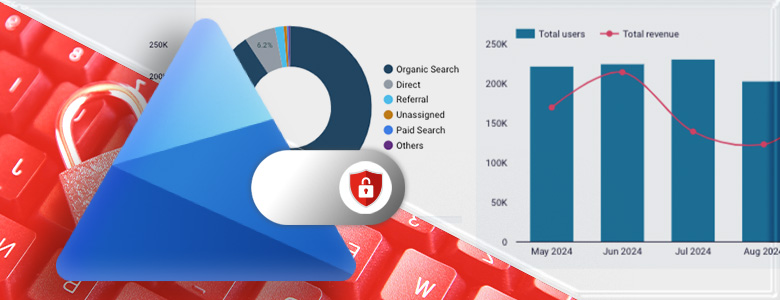When visiting websites, you have likely noticed alerts similar to the one below asking users for permission to collect and process their data:

Google Consent Mode (GCM) is a powerful tool that enables marketers to comply with stringent data privacy regulations like the General Data Protection Regulation (GDPR) and the California Consumer Privacy Act (CCPA) while continuing to collect valuable user data.
When a Google Consent Mode banner gives users the options to “accept all,” “reject” or “customize,” it indicates that the business is respecting their privacy and giving them control over how their data is used:
• “Accept All” allows the website to collect all necessary data to provide a full range of features and personalized experiences. The potential privacy trade-off: by accepting all cookies, the user may be sharing more personal information than necessary.
• “Reject All” minimizes data collection to the absolute minimum required for a website to function, and users may experience some limited functionality with reduced features or personalization options.
• “Customize” allows users to choose which specific categories of cookies and trackers to allow or block and provides a personalized experience to their preferences, ensuring only necessary data is collected.
By providing these options, businesses can balance data collection needs with user privacy, ensuring a transparent and user-centric approach to digital marketing.
Why Should B2B Marketers Care About GCM?
As data privacy regulations tighten and user experiences evolve, understanding and implementing GCM is crucial. It directly impacts a marketer’s ability to collect important user data, personalize marketing efforts, and measure campaign performance. By implementing GCM on your website, B2B marketers can:
• Avoid large fines and legal repercussions by adhering to data privacy laws.
• Protect brand reputation and maintain trust with customers.
• Improve user satisfaction and loyalty by respecting privacy preferences.
• Collect accurate and reliable data by ensuring it’s obtained with explicit consent.
• Make data-driven decisions to optimize marketing campaigns and improve ROI.
• Personalize marketing messages and tailor content to individual user preferences.
Important Note: As of March 2024, Google Consent Mode is no longer optional for any website that uses Google services and wants to continue using ad personalization features and collecting user data in the European Economic Area. It’s imperative for marketers to implement GCM to adhere to privacy regulations and avoid potential penalties and reputational damage.
Our experienced B2B digital marketing team can help you navigate Google Consent Mode and any website development efforts by providing expert guidance, technical implementation, and ongoing optimization to ensure compliance, enhance user experience, and maximize marketing effectiveness.
Reach out today to discuss your specific website needs.
Selecting a Version: Google Consent Mode Basic vs. Advanced
GCM is offered in two versions: basic and advanced. Each version provides different levels of control and customization over how Google tags and cookies behave based on user consent.
Basic Consent Mode is a simpler option that is easier to implement and configure. It offers basic control over tag and cookie behavior, with tags loading only after user consent is obtained. While this approach can help with basic data collection, it may limit the depth of insights and personalization capabilities due to delayed tag loading and basic data modeling techniques.
Advanced Consent Mode provides greater flexibility and control over tag and cookie behavior. While it requires more technical expertise to implement and configure, it offers immediate tag loading and advanced data modeling techniques. This enables more accurate data analysis and personalized experiences, even when users have limited consent. It is important to note that this increased complexity may require more time and resources to set up and maintain.
The digital marketing experts at Stifel Marcin can help you weigh the pros and cons of Google Consent Mode basic versus advanced and implement the optimal solution for your business goals and user experience.
Potential Consequences of Non-Compliance
The importance of correctly implementing Google Consent Mode cannot be understated. If a website does not include privacy functionalities like GCM, it risks several consequences:
1. Non-Compliance with Data Privacy Regulations: Failing to comply with GDPR, CCPA, and other privacy data laws can lead to hefty fines, legal repercussions, and damage to the website’s reputation.
2. Reduced Data Accuracy and Insights: Without proper consent management, the website may collect inaccurate or incomplete data, hindering its ability to make data-driven decisions and optimize marketing efforts.
3. Limited Marketing Effectiveness: Incomplete or inaccurate data can lead to less effective targeting, personalization, and measurement of marketing campaigns, ultimately impacting the website’s ROI.
4. Damaged User Experience: Users may perceive the website as untrustworthy if it collects data without explicit consent, leading to a negative user experience and potential loss of visitors.
5. Potential Impact of Google Services: Google may limit the effectiveness of its services, such as Google Ads and Google Analytics, for websites that do not comply with privacy regulations and implement proper consent mechanisms.
If you or members of your marketing team are asking “what is Google Consent Mode and do we really need it,” that answer is a resounding yes. It’s imperative to prioritize data privacy and implement robust consent management practices to both safeguard your business and protect your users.
Our team is here to assist you in navigating the complexities of GCM and can help you create optimal digital experiences that inspire user trust while safely collecting data that helps inform marketing campaigns, generate leads, and grow brands.
Leverage Our B2B Digital Marketing Expertise
Understanding web privacy and data compliance is crucial for any business looking to succeed in the digital landscape. If you are asking specific questions like “what is Google Consent Mode,” our B2B marketing team wants to talk to you. With our expertise in digital marketing strategy, data analytics, and compliance best practices, we can help you achieve your specific goals while ensuring your business is protected and thriving.

Stifel Marcin – The B2B Marketing Agency
Unlike many advertising and marketing agencies, B2B isn’t just something that we do, it’s all we do. We’ll work to help your brand achieve its goals through the strategic combination of creativity, communication and technology. Our focused client intake processes give us the ability to thoroughly understand your business, products and objectives, working to identify the competitive advantages and opportunities that will grow awareness, leads and sales. We develop innovative marketing plans with strategic, data-driven processes, presenting complex ideas and compelling messages that position your business ahead of the competition.
As your cooperative partner, our integrated B2B marketing agency is dedicated to your success. If you are pondering the question “what is Google Consent Mode” and wondering how to implement its features on your website, or you are in need of web and digital marketing services, let’s talk.




